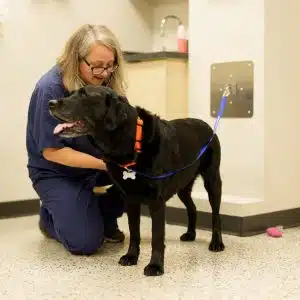Why Veterinary Oncology Services improve treatment outcomes
Wiki Article
Comprehensive Overview to the Services Supplied by a Vet Oncologist
Veterinary oncology includes a vast selection of solutions targeted at dealing with and diagnosing cancer cells in pets. Veterinary Cancer Specialist. Oncologists employ innovative diagnostic methods and offer different treatment choices customized to each pet's demands. They also focus on supportive care and give important sources for pet owners. Recognizing these services is vital for making educated decisions. What certain facets of veterinary oncology can significantly affect a pet dog's treatment journey?Recognizing Vet Oncology
Veterinary oncology is a specialized field concentrated on treating and identifying cancer cells in pets. This technique incorporates a wide variety of techniques, from clinical therapies such as chemotherapy and immunotherapy to surgical interventions aimed at eliminating lumps. Vet oncologists are educated to identify the unique manifestations of cancer in various types, enabling them to tailor treatment plans to private clients.In addition to standard therapies, veterinary oncology highlights helpful care, which plays a necessary duty in boosting the top quality of life for damaged pets. This includes pain management, nutritional support, and palliative treatment alternatives. Cooperation with pet dog proprietors is vital, as they are important to decision-making concerning their pets' treatment courses. As study breakthroughs, vet oncology proceeds to develop, providing new hope and improved end results for family pets identified with cancer. Overall, this area is essential for dealing with the complexities of cancer cells in buddy animals.
Advanced Diagnostic Techniques
Advanced analysis strategies play a necessary function in veterinary oncology, giving important insights right into the existence and extent of cancer cells in animals. Imaging modalities such as ultrasound, CT scans, and MRI are generally utilized to visualize lumps and evaluate their characteristics. In addition, biopsy procedures are necessary for getting tissue examples, enabling clear-cut diagnosis and customized treatment strategies.Imaging Modalities Utilized
Imaging techniques play an essential function in the diagnosis and administration of cancer in animals. Vet oncologists use various sophisticated imaging techniques to examine tumor dimension, metastasis, and existence. Radiography, or X-rays, offers a preliminary sight of bone and chest conditions, while ultrasound gives real-time imaging of soft tissues, permitting thorough assessment of interior body organs. Computed tomography (CT) improves visualization of intricate physiological structures and allows 3D repairs, aiding in accurate growth localization. Magnetic vibration imaging (MRI) is important for soft tissue distinction, specifically in brain tumors. Furthermore, nuclear medication strategies such as positron discharge tomography (FAMILY PET) aid identify metabolic activity within tumors. Collectively, these techniques improve analysis precision, leading effective treatment techniques for oncological clients.Biopsy Procedures Described
Adhering to the first analysis via imaging methods, getting a definitive medical diagnosis frequently requires tissue sampling through biopsy procedures. Vet oncologists make use of numerous biopsy strategies based upon the growth's place and attributes. Great needle ambition (FNA) is a minimally invasive method that extracts cells for cytological examination, ideal for surface masses. Core needle biopsies give bigger tissue samples and are helpful for deeper lumps, permitting for histopathological evaluation. Surgical biopsies include excising a portion or the entire lump, promoting detailed examination. These procedures not just confirm the existence of cancer however likewise assist identify its type and grade, directing treatment choices. Each biopsy technique is selected carefully to stabilize diagnostic accuracy with person security and comfort.Treatment Alternatives for Cancer in Family pets
When an animal is detected with cancer, a selection of treatment choices appear to help handle the condition and improve top quality of life. Veterinary oncologists commonly recommend a multidisciplinary technique customized to the private family pet's requirements, which might include surgical treatment, radiation treatment, immunotherapy, or alternative treatments.Surgical procedure is frequently utilized to get rid of tumors and affected tissues, possibly resulting in total remission sometimes. Radiation therapy aims to ruin and target cancer cells, lowering tumor size and easing symptoms - Veterinary Oncology Services. Immunotherapy uses the pet's immune system to combat cancer a lot more properly, while different treatments might include acupuncture or herbal supplements to support overall health
Each treatment option carries its own benefits and risks, and vet oncologists function very closely with pet dog proprietors to make an extensive plan that lines up with the animal's particular diagnosis and the owner's dreams. The utmost goal is to enhance the pet dog's convenience and lifestyle throughout their cancer cells trip.
Radiation treatment for Animals
Chemotherapy is a common therapy alternative for pet dogs detected with cancer and is typically utilized along with other treatments detailed by veterinary oncologists. This treatment entails the management of certain drugs designed to target and destroy cancer cells, consequently minimizing growth size and protecting against the spread of the illness. Veterinary oncologists customize radiation treatment protocols based upon the kind of cancer, the pet dog's general health, and the wanted treatment outcome.Adverse effects can happen, as these drugs might likewise influence healthy cells. Common responses include nausea or vomiting, vomiting, and short-term modifications in appetite - Board Certified Veterinary Oncologist. Vet oncologists are furnished to manage these adverse effects effectively, making certain the animal's convenience throughout the treatment procedure. Regular tracking via blood tests and follow-up consultations is necessary to analyze the animal's feedback to chemotherapy and make needed adjustments. Eventually, radiation treatment can provide considerable advantages, enhancing the lifestyle for pet dogs facing cancer medical diagnoses

Radiation Treatment in Veterinary Medication
Radiation therapy works as an efficient treatment alternative for animals diagnosed with local tumors, supplying a targeted method to cancer cells administration. This technique makes use of high-energy radiation to damage the DNA of cancer cells, hindering their ability to multiply. It is particularly valuable for growths that are not open to medical removal or for cases where surgical procedure may not be practical due to the lump's location.Veterinary oncologists customize additional info radiation protocols based upon lump location, kind, and dimension, as well as the animal's total health. Treatment can be supplied via outside light beam radiation or brachytherapy, each with distinct advantages. Commonly, multiple sessions are needed to maximize effectiveness while lessening negative effects.
Although animals might experience short-lived reactions such as skin irritation, the general purpose is to reduce tumors and reduce signs, eventually boosting the pet dog's prognosis and lifestyle. Appropriately, radiation therapy plays a vital function in complete cancer cells care.
Palliative Care and Lifestyle
Palliative care in veterinary oncology concentrates on boosting the top quality of life for family pets dealing with incurable health problems, making certain convenience and self-respect in their final days. This specialized approach focuses on discomfort administration, sign control, and emotional assistance. Vet oncologists evaluate each pet's individual demands, customizing interventions to alleviate pain and enhance general well-being.Strategies may include carrying out medicines for pain alleviation, taking care of queasiness, and addressing various other stressful symptoms. In addition, nutritional assistance is often given to keep strength and boost hunger. The psychological facet of palliative treatment is equally important; producing a calm environment assists lower anxiousness for both pet and proprietor.
Inevitably, the objective of palliative treatment is to permit animals to enjoy their staying time with as much delight and dignity as feasible. By focusing on comfort and lifestyle, vet oncologists play a necessary role in making certain that family pets and their family members navigate this tough trip with empathy and understanding.
Assistance for Family Pet Owners During Treatment

Emotional Guidance for Proprietors
Charting the emotional landscape during a pet's cancer cells treatment can be a frustrating experience for owners. The uncertainty surrounding diagnosis and diagnosis can bring about feelings of unhappiness, anxiety, and helplessness. Veterinary oncologists identify the importance of psychological assistance and often provide support to aid proprietors navigate this tough journey. Interaction is essential; reviewing treatment options and prospective end results can reduce some anxieties. In addition, using reassurance that psychological reactions stand fosters a supportive atmosphere. Numerous oncology clinics might additionally recommend support groups or counseling solutions customized for animal proprietors, promoting shared experiences. Encouraging owners to focus on self-care during this moment is essential, as their emotional well-being straight influences their family pet's convenience and overall treatment experience.
Resources and Educational Products
Guiding via the complexities of a pet's cancer therapy can be daunting for owners, making access to dependable resources and instructional materials necessary. Veterinary oncologists usually give a range of handouts, pamphlets, and online materials that explain treatment options, prospective adverse effects, and treatment methods. These sources assist debunk the procedure and empower animal proprietors to make informed decisions. Furthermore, several oncology clinics use access to sustain discussion forums and teams where proprietors can attach with others dealing with comparable challenges, cultivating a sense of area. Educational webinars and workshops performed by veterinary experts further enhance understanding, ensuring that owners are well-appointed to navigate their pet dog's journey through cancer therapy with self-confidence and knowledge.Often Asked Inquiries
Just How Can I Prepare My Family Pet for a Veterinary Oncology See?
Preparing an animal for a veterinary oncology see involves celebration medical records, noting signs, and making sure the family pet fits. A tranquil attitude and acquainted products can help ease anxiety throughout the consultation.What Are the Indicators My Animal May Have Cancer Cells?
Indicators that a pet may have cancer cells include unexplained weight loss, persistent vomiting or diarrhea, uncommon try this site lumps or swellings, sleepiness, adjustments in cravings, trouble breathing, and alterations in actions. Trigger veterinary interest is important.Exactly How Can I Assistance My Animal Mentally During Therapy?
Sustaining a pet emotionally during therapy includes providing convenience, maintaining regimens, using gentle affection, and making certain a calm setting. Participating in peaceful play and normal companionship assists minimize stress and anxiety and cultivates a sense of protection.our website
Are There Alternate Treatments for Pets With Cancer?
Alternative treatments for pets with cancer cells include acupuncture, herbal treatments, and dietary assistance. These methods might complement traditional therapies, promoting overall health. Consulting with a veterinarian is important for safe and reliable assimilation of alternative therapies.What Costs Should I Expect for Vet Oncology Providers?
The awaited costs for vet oncology services can differ substantially, frequently affected by diagnostics, treatments, and continuous treatment. Family pet proprietors ought to plan for costs ranging from consultations to specialized treatments, showing the intricacy of cancer administration.Partnership with animal proprietors is important, as they are integral to decision-making concerning their animals' therapy courses. Each therapy alternative lugs its own advantages and dangers, and vet oncologists function very closely with animal proprietors to make an extensive strategy that lines up with the pet's certain diagnosis and the proprietor's dreams. Pet dogs might experience short-term reactions such as skin irritability, the total purpose is to shrink growths and ease signs and symptoms, eventually boosting the family pet's prognosis and quality of life. Support for pet owners throughout treatment is essential in guiding via the emotional challenges linked with an animal's cancer cells diagnosis. Preparing a pet dog for a veterinary oncology visit involves celebration clinical documents, noting symptoms, and ensuring the pet dog is comfy.
Report this wiki page